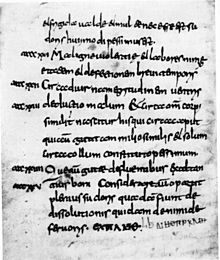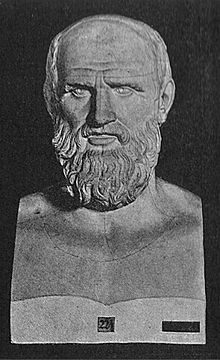Corpus Hippocraticum
The Corpus Hippocraticum (also called Hippocratic Scriptures ) is a collection of more than 60 ancient medical texts dating from the 6th century BC. Chr. And 2nd century. Chr. Have emerged and v from the 3rd century. BC, especially in Alexandria , have been brought together to form a complete corpus .
The text collection, characterized by a scientific-rational spirit, is named after the famous Greek doctor Hippocrates of Kos , but it was already known in antiquity that very few texts of the corpus were written by himself. Such texts are called pseudohippocratic . Polybos, the pupil and presumed son-in-law of Hippocrates, was named as co-author of the corpus.
Teaching
The writings of the Corpus cover numerous topics of scientific medicine and offer an introduction for doctors and laypeople. The theory and practice of medicine, general and special pathology , ethics and class were covered.
In addition to great similarities, numerous inconsistencies in terms of content, form and style can be identified, which indicate a long period of origin. The research into the authorship of the individual texts and their origin was expanded by attempts to assign them to two different medical schools, namely that of Kos and that of Knidos , a city that was directly opposite the island of Kos on the coast of Asia Minor and another important one Healing center had. In the meantime, however, the term “schools” and the associated perception have been heavily criticized, since it was never possible to assign the texts to the respective centers and to prove a strongly contrary orientation without any doubt.
The writings contain the first beginnings of ancient humoral pathology , but a uniform version has not yet been achieved.
The observation of disease progression can be mentioned as a general method. The inside of the body remained largely unknown, as no experiment or dissection was carried out on humans. Further principles are the doctrine of the critical days of illness, the rational explanation of illnesses (e.g. epilepsy in "On the Holy Disease") and the great influence of the environment on human health. There are also first theories of ontogenesis in the text About the meat ( De carnibus ), which is not therapeutically oriented , e.g. B. on the formation of body parts and organs.
The writings of the corpus
|
|
|
Work editions
- Émile Littré (Ed.): Oeuvres complètes d'Hippocrate. 10 volumes, Paris 1839–1861; Reprinted in Amsterdam 1973–1982.
- Complete editions with translation, started in:
- Corpus Medicorum Graecorum. Dept. I, (Leipzig and) Berlin 1927 ff.
- Collection des Universités de France: Hippocrate. Paris 1967 ff.
- Anuce Foës (for a long time authoritative editions of the Corpus Hippocraticum):
- Anutius Foësius: Oeconomia Hippocratis alphabeti serie distincta etc. Frankfurt am Main 1588 ff., And Geneva 1662–1663.
- Anutius Foësius: Hippocratis Opera. Critical edition and Latin translation by Janus Cornarius , Frankfurt am Main 1591 ff., And Geneva 1657–1658.
Translations
-
Hippocrates: writings. The beginnings of western medicine . Translated and edited by Hans Diller . Rowohlt, Reinbek 1962.
- New edition: Hippocrates: Selected writings. With a bibliographical appendix by Karl-Heinz Leven . Reclam, Stuttgart 1994, ISBN 3-15-009319-8 (with explanations).
- Richard Kapferer, Georg Sticker (ed.): The works of Hippocrates. The Hippocratic collection of writings in a new German translation. 5 volumes, Stuttgart (and Leipzig) 1933–1940.
literature
Overview representations
- Jochen Althoff : Medical literature. In: Bernhard Zimmermann (Hrsg.): Handbook of Greek literature in antiquity. The literature of the archaic and classical times (= handbook of ancient studies. 7th section, volume 1). CH Beck, Munich 2011, ISBN 978-3-406-57673-7 , pp. 295-320.
- Gerhard Fichtner : Corpus Hippocraticum. Directory of the Hippocratic and Pseudo-Hippocratic Scriptures. Tubingen 1985.
Introductions and investigations
- Karlhans Abel : The doctrine of the blood circulation in the Corpus Hippocraticum . In: Hermes 86, 1958, pp. 192-219.
- Elizabeth Craik : The 'Hippocratic' Corpus. Content and Context. Routledge, London 2015.
- Johann Heinrich Dierbach : The drugs of Hippocrates, or attempt at a systematic enumeration of the drugs occurring in all Hippocratic writings. Karl Groos' new academic bookshop, Heidelberg 1824.
- Cătălin Enache: Ontology and Meteorology in Hippocrates' "On Regimen". In: Mnemosyne. Volume 72, 2019, pp. 173-96 .
- Werner Golder: Hippocrates and the Corpus Hippocraticum. An introduction for philologists and medical professionals. Königshausen & Neumann, Würzburg 2007, ISBN 978-3-8260-3335-3 .
- Joseph-Hans Kühn : System and method problems in the Corpus Hippocraticum (= Hermes individual writings. Volume 11). Wiesbaden 1956.
- Max Neuburger : The Hippocratic Writings (Corpus Hippocraticum). In: Max Neuburger: History of Medicine. Enke, Stuttgart 1906, Volume 1, pp. 175-182 (digitized version ) .
- Max Pohlenz : Hippokrates and the foundation of scientific medicine. Berlin 1938.
Collections of articles
- Mirko D. Grmek (Ed.): Hippocratica. Actes du Colloque hippocratique de Paris (September 4-9, 1978). Paris 1980.
- Paul Potter, Gilles Maloney, Jacques Desautels (eds.): La maladie et les maladies dans la Collection hippocratique. Actes du VIe Colloque International Hippocratique (Québec, you 28 September to 3 October 1987). Québec 1990.
Word index
- Joseph-Hans Kühn , Ulrich Fleischer et al .: Index Hippocraticus . Vandenhoeck & Ruprecht, Göttingen 1989, Α – Δ: 1986 ( digitized version), Ε – Κ: 1987 ( digitized version ), Λ – Π: 1988 ( digitized version ), Π – Ω, Addenda et Corrigenda: 1989 ( digitized version ).
- Anargyros Anastassiou, Dieter Irmer : Index Hippocraticus. Supplement . Vandenhoeck & Ruprecht, Göttingen 1999 ( digitized version )
Web links
- Hippocrates: works; translated by Francis Adams (English) .
- Gerhard Fichtner : Corpus Hippocraticum: Bibliography of the Hippocratic and pseudohippocratic works . Extended and improved edition, Tübingen 2013 (PDF; 450 kB).
Remarks
- ^ Gundolf Keil : 'Corpus hippocraticum'. In: Werner E. Gerabek , Bernhard D. Haage, Gundolf Keil, Wolfgang Wegner (eds.): Enzyklopädie Medizingeschichte. De Gruyter, Berlin / New York 2005, ISBN 3-11-015714-4 , p. 274 f.
- ↑ Jutta Kollesch , Diethard Nickel : Ancient healing art. Selected texts from the medical writings of the Greeks and Romans. Philipp Reclam jun., Leipzig 1979 (= Reclams Universal Library. Volume 771); 6th edition ibid 1989, ISBN 3-379-00411-1 , p. 7.
- ↑ Cf. for example Dietrich Blanke: The pseudohipporatical "Epistula de sanguine cognoscendo". Medical dissertation Bonn 1974.
- ↑ Hermann Grensemann : The doctor Polybos as the author of Hippocratic writings (= Academy of Sciences and Literature. Treatises of the humanities and social sciences class. Year 1968, No. 2). Verlag der Akademie der Wissenschaften und der Literatur in Mainz (Commissioned by Franz Steiner Verlag, Wiesbaden), Mainz 1968, in particular pp. 53–55 ( on the person ) and pp. 56–58 ( Polybos as the author of Swiss writings ).
- ^ Karl Deichgräber: From the history of scientific criticism in the Corpus Hippocraticum. In: Medizinhistorisches Journal 6, 1971, pp. 97–112; here: pp. 106–110.
- ↑ Carolin M. Oser-Grote: Aristoteles and the Corpus Hippocraticum: the anatomy and physiology of man. Stuttgart 2004.
- ↑ Brice Maucolin: Investigations into the Hippocratic writing “About the ancient healing art” (= contributions to antiquity . Volume 258). de Gruyter, Berlin a. a. 2009, ISBN 978-3-11-020125-3 (also dissertation, Saarland University 2005).
- ↑ Anne Liewert: The meteorological medicine of the Corpus Hippocraticum (= studies on ancient literature and history. Volume 119). de Gruyter, Berlin a. a. 2015, ISBN 978-3-11-041699-2 (also dissertation, University of Kiel 2013).
- ↑ In addition Lutz Alexander Graumann: The medical histories of the epidemic books of the Corpus Hippocraticum. Medical historical significance and possibilities of retrospective diagnosis. Shaker-Verlag, 2000.
- ↑ Cf. also Georg Sticker : Hippokrates: Der Volkskrankheiten first and third book (around the year 434–430 BC). Translated from the Greek, introduced and explained by Georg Sticker. Johann Ambrosius Barth, Leipzig 1923 (= Classics of Medicine. Volume 29); Unchanged reprint: Central antiquariat of the German Democratic Republic, Leipzig 1968.
- ↑ FR Hurlbutt Jr .: Peri kardies. A treatise on the heart from the Hippocratic corpus. In: Bulletin of the Historiy of Medicine 7, 1939, pp. 1104-1113.
- ↑ Markwart Michler †: Foësius, Anutius. In: Werner E. Gerabek , Bernhard D. Haage, Gundolf Keil , Wolfgang Wegner (eds.): Enzyklopädie Medizingeschichte. De Gruyter, Berlin / New York 2005, ISBN 3-11-015714-4 , p. 407.

